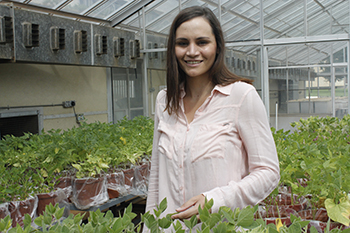
Marcill Venter, lecturer in the Department of
Agricultural Economics at the University of the
Free State, has developed the mathematical
programming system, Soil Water Irrigation
Planning and Energy Management in order to
determine irrigation pump hours.
Photo: Rulanzen Martin
Her advice to farmers is that they should make sure they are aware of the total cost (investment and operating costs) of an irrigation system. In most cases the investment cost is low, but the operating cost over the lifetime of the system is high.
“It is very important to have a look at the total cost and to install the most economic system,” says Marcill Venter, lecturer at the University of the Free State (UFS), who has done research on the economic sustainability of water-pipe systems.
Irrigation systems important components for farming
This research comes at a time when many farmers are relying on their irrigation systems due to persistent drought and low rainfall during 2016. South Africa has also experienced an abnormal increase in electricity tariffs in recent years. Due to tariff increases which threaten the future profitability of irrigation producers, the Water Research Commission (WRC) has launched and financed a project on the sustainable management of irrigation farming systems. “I had the opportunity to work on the project as a researcher,” says Venter.
The heart of every irrigation system is the water pipes that bring life to crops and livestock, and this is what Venter’s research is about. “Water pipes are part of the whole design of irrigation systems. The design of the system impact certain factors which determine the investment and operating costs,” she says.
Mathematical system to help farmers
Venter and Professor Bennie Grové, also from the Department of Agricultural Economics at the UFS, designed the Soil Water Irrigation Planning and Energy Management (SWIP-E) programming model as part of the WRC’s project, as well as for her master’s degree. “The model determines irrigation pump hours through a daily groundwater budget, while also taking into account the time-of-use electricity tariff structure and change in kilowatt requirements arising from the main-line design,” says Venter. The model is a non-linear programming model programmed in General Algebraic Modeling System (GAMS).
Design of irrigation system important for sustainability
The main outcome of the study is that the time-of-use electricity tariff structure (Ruraflex) is always more profitable than the flat-rate structure (Landrate). The interaction between the management and design of a system is crucial, as it determines the investment and operating costs. Irrigation designers should take the investment and operating cost of a system into account during the design process. The standards set by the South African Irrigation Institute (SAII) should also be controlled and revised.
Water-pipe thickness plays major role in cost cuts
There is interaction between water-pipe thickness, investment and operating costs. When thinner water pipes are installed, it increases the friction in the system as well as the kilowatt usage. A high kilowatt increases the operating cost, but the use of thinner water pipes lowers the investment cost. Thicker water pipes therefore lower the friction and the kilowatt requirements, which leads to lower operating costs, but thicker pipes have a higher investment cost. “It is thus crucial to look at the total cost (operating and investment cost) when investing in a new system. Farmers should invest in the system with the lowest total cost,” says Venter.